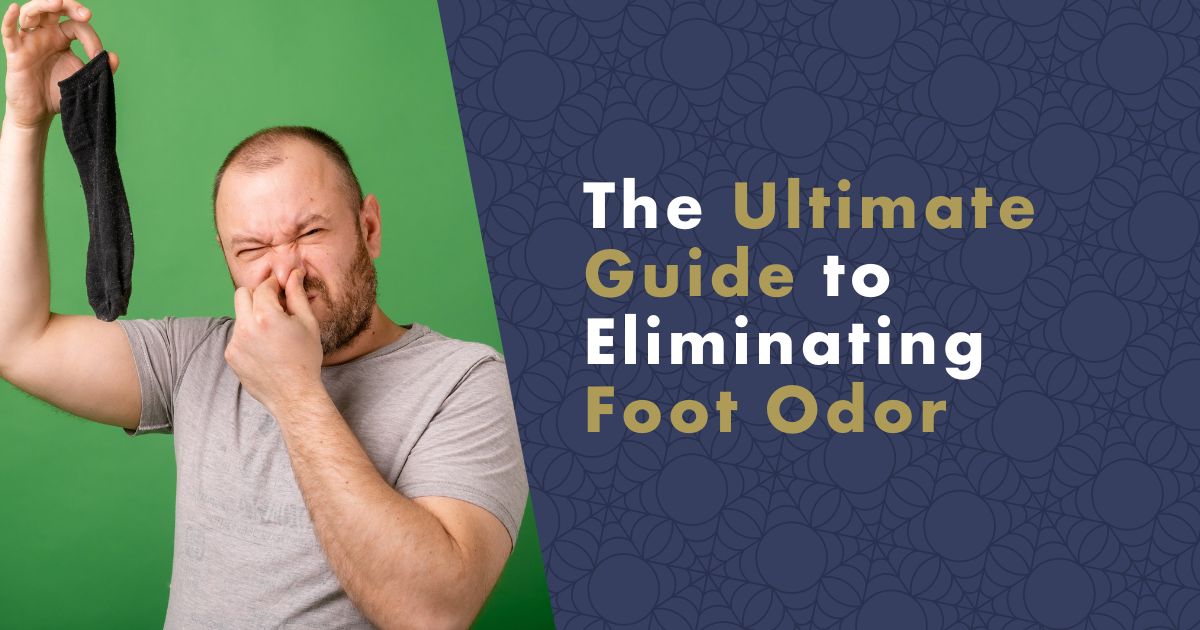Dealing with unpleasant foot odor is a common concern that many individuals face. Whether it's a result of long hours on your feet, intense physical activity, or certain footwear choices, the need for effective foot odor removal solutions is undeniable. This article explores various methods to combat smelly feet, ranging from specialized socks and sprays to innovative shoe insoles. Additionally, we'll delve into some home remedies that offer practical and natural alternatives for keeping foot odor at bay. Discovering the right approach to tackle this common issue can not only enhance personal comfort but also contribute to overall foot health.

Causes of Smelly Feet: Unveiling the Culprits
Smelly feet, medically known as bromodosis, are often caused by thriving bacteria that feed on dead skin cells. During this process, they release a range of sulfur-containing waste products, which are the true culprits behind the unpleasant odor.
The reason foot odor specifically manifests is due to the ideal conditions it provides for bacterial growth. Enclosed footwear not only offers an abundance of nutrients but also optimal humidity and temperature, particularly during the summer season or periods of intense physical activity. However, it's worth noting that foot odor can occur even in sandals. The space between the sole and bare skin creates a microclimate similar to that of closed shoes.
While opting for more breathable footwear is a solution, it is not always feasible. You wouldn't wear sneakers on a mountain hike, and wearing slippers in a production facility or workshop would likely earn you a reprimand. So, what can you do in such circumstances?
The Foundation: Proper Hygiene
If you struggle with foot odor, it should be a priority to regularly wash your feet with warm water and soap – even multiple times a day, especially if you tend to perspire excessively. Enhance the "disinfecting" effect by soaking your feet in a warm water bath for at least 30 minutes. A simple basin filled with water, to which you can add substances with antimicrobial properties like vinegar, black tea, or ordinary kitchen salt, will suffice.
To prevent foot odor, it is essential to regularly remove dead skin cells, particularly from the heels. However, avoid using metallic scrapers, as they may inadvertently remove healthy skin along with calluses. Such injuries can lead to scarring, infections, and inflammation.
Several products on the market can dissolve dead skin cells effectively. Simply apply the solution and let it work for approximately 15 minutes, then wipe away the residue. After removing hardened skin, thoroughly dry your feet and apply a cream with antimicrobial properties.
In cases involving fungal infections, a specific condition requiring medical treatment, the following symptoms may manifest:
- Itching and burning sensations on the skin
- Dryness and redness
- Small cracks in the skin
If you experience similar symptoms, it is advisable to set aside embarrassment and consult a dermatologist. They can prescribe appropriate treatments to combat the fungal infection within a few weeks.
Don't forget to treat your footwear with a suitable spray to eliminate unpleasant odors. For more information, refer to our comprehensive guide on combating shoe odors.
#produkty#https://www.nanospace.store/sport-socks/
Silver-Infused Socks: The Ideal Solution for Foot Odor
A highly effective measure against bacterial proliferation and the development of foot odor is the use of socks infused with silver particles.
Why silver? This metal effectively inhibits the growth of bacteria and fungi – the root causes of the unpleasant odors we've discussed.
Nano-sized silver particles within the fabric of these socks adhere to the membranes and enzymes of microorganisms, deforming them in a way that renders them ineffective. As a result, bacteria and fungi perish rapidly. The silver content is sufficient to provide antimicrobial properties throughout the lifespan of the socks. Various types of silver-infused socks are available on the market, including:
- Sports socks with silver
- Medical socks with silver
- Formal socks with silver
- Compression socks with silver
To learn more about the specific types and materials of these products, refer to our comprehensive guide on silver-infused socks.
Foot Odor Spray and Antibacterial Shoe Inserts
For those dealing with persistent foot odor, consider trying foot odor sprays and antibacterial inserts for your shoes. These products help absorb unpleasant odors and keep your feet feeling fresh throughout the day.
In conclusion, overcoming foot odor requires a multi-faceted approach that includes proper hygiene, the use of silver-infused socks, and the utilization of foot odor sprays and antibacterial inserts. By implementing these effective solutions, you can bid farewell to foot odor and regain confidence in social situations.

Home Remedies for Foot Odor: Natural Solutions for Fresh Feet
- Baking soda is a versatile ingredient known for its odor-absorbing properties. Sprinkle some baking soda inside your shoes and socks to help absorb moisture and neutralize unpleasant odors. You can also make a paste by mixing baking soda with water and applying it to your feet. Leave it on for a few minutes before rinsing it off to reduce foot odor.
- Certain essential oils possess antimicrobial properties and pleasant scents, making them great additions to your foot care routine. Tea tree oil, lavender oil, peppermint oil, and eucalyptus oil are known for their antibacterial properties. Add a few drops of your preferred essential oil to a carrier oil, such as coconut oil or olive oil, and massage it into your feet. This can help combat bacteria and leave your feet smelling fresh.
-
Proper shoe care: Foot odor can often be caused or worsened by bacteria thriving in your shoes. To prevent this, ensure you take proper care of your footwear: Regularly clean and air out your shoes. Remove insoles and wash them if possible. Use antibacterial sprays or powders designed for shoes to eliminate odor-causing bacteria. Alternate between different pairs of shoes to allow them to fully dry and air out between uses. Consider wearing moisture-wicking socks made of natural fibers to keep your feet dry and prevent bacterial growth. By implementing these home remedies and adopting a consistent foot care routine, you can effectively manage foot odor and enjoy fresh, odor-free feet.

What to Take Away from the Article?
- Foot odor is caused by bacteria feeding on dead skin cells and releasing sulfur-containing waste products.
- Proper hygiene, such as regular washing and soaking in antimicrobial solutions, is crucial for preventing foot odor.
- Be cautious when removing dead skin cells and avoid using metal scrapers to prevent injuries and infections.
- Fungal infections require medical treatment and should not be ignored.
- Silver-infused socks effectively inhibit the growth of bacteria and fungi, combating foot odor.
- Foot odor sprays and antibacterial shoe inserts can help absorb unpleasant odors and keep feet fresh.
- Implementing these solutions can lead to long-lasting relief from foot odor.
FAQ
What causes foot odor?
Foot odor is caused by bacteria that feed on dead skin cells and produce waste products containing sulfur, resulting in an unpleasant smell.
How can I prevent foot odor?
You can prevent foot odor by practicing good foot hygiene, such as washing your feet regularly, keeping them dry, wearing breathable shoes and socks, and using foot powders or sprays.
Are there any home remedies for foot odor?
Yes, there are several home remedies you can try, such as soaking your feet in vinegar or black tea, using baking soda as a foot powder, or applying lemon juice to your feet.
Can foot odor be a sign of a medical condition?
In some cases, foot odor can be a symptom of a medical condition like athlete's foot or fungal infection. If home remedies don't work, it's best to consult a healthcare professional.
Are silver-infused socks effective in eliminating foot odor?
Yes, silver-infused socks are known for their antimicrobial properties, which help reduce bacteria and odor. They can be an effective solution for combating foot odor.
How often should I change my socks to prevent foot odor?
It's recommended to change your socks daily, especially if you have sweaty feet. Using moisture-wicking socks and changing them more frequently during physical activity can also help.
What type of shoes should I wear to minimize foot odor?
Opt for shoes made of breathable materials like leather or mesh, as they allow better air circulation. Avoid wearing tight or non-breathable shoes for extended periods.
Can foot odor be hereditary?
While foot odor is primarily caused by bacteria and hygiene factors, some individuals may have a genetic predisposition to excessive sweating, which can contribute to foot odor.
Are there any over-the-counter products to treat foot odor?
Yes, there are foot odor sprays, powders, and insoles available over the counter that can help control odor and absorb moisture. Look for products with antimicrobial properties.
When should I seek medical help for persistent foot odor?
If home remedies and over-the-counter products do not effectively address persistent foot odor or if you experience other symptoms like itching, redness, or skin changes, it's advisable to consult a healthcare professional for proper diagnosis and treatment.
Sources
- Nowack, B., Krug, H.F., & Height, M. (2010). 120 years of nanosilver history: Implications for policy makers. Environmental Science & Technology, 45(3), 1177-1183.
- Hendren, C.O., Mesnard, X., Dröge, J., & Wiesner, M.R. (2011). Estimating production data for five engineered nanomaterials as a basis for exposure assessment. Environmental Science & Technology, 45(6), 2562-2569.
- Edwards-Jones, V. (2009). The benefits of silver in hygiene, personal care and healthcare. Letters in Applied Microbiology, 49(2), 147-152. ISSN: 0266-8254. DOI: 10.1111/j.1472-765X.2009.02648.x.
- Windler, L., Height, M., & Nowack, B. (2013). Comparative evaluation of antimicrobials for textile applications. Environment International, 53, 62-73.
- Fabrega, J., Luoma, S.N., Tyler, C.R., Galloway, T.S., & Lead, J.R. (2011). Silver nanoparticles: Behaviour and effects in the aquatic environment. Environment International, 37(2), 517-531.
- Walser, T., Demou, E., Lang, D.J., & Hellweg, S. (2011). Prospective environmental life cycle assessment of nanosilver t-shirts. Environmental Science & Technology, 45(13), 4570-4578.
- Geranio, L., Heuberger, M., & Nowack, B. (2009). The behavior of silver nanotextiles during washing. Environmental Science & Technology, 43(21), 8113-8118.
- Hemmati, A., Scott, K., & Davis, J. (2009). Nano Analysis of Silver Nanoparticles in Commercial Socks. Microscopy and Microanalysis, 15(S2), 552-553. doi:10.1017/S1431927609094902
- Deshmukh, S.P., Patil, S.M., Mullani, S.B., & Delekar, S.D. (2019). Silver nanoparticles as an effective disinfectant: A review. Materials Science and Engineering: C, 97, 954-965. ISSN: 0928-4931. DOI: 10.1016/j.msec.2018.12.102.
- Antibacterial activity of silver nanoparticle-coated fabric and leather against odor and skin infection causing bacteria
- Silver in Health Care: Antimicrobial Effects and Safety in Use
- Antibacterial activity of silver-killed bacteria: the "zombies" effect

